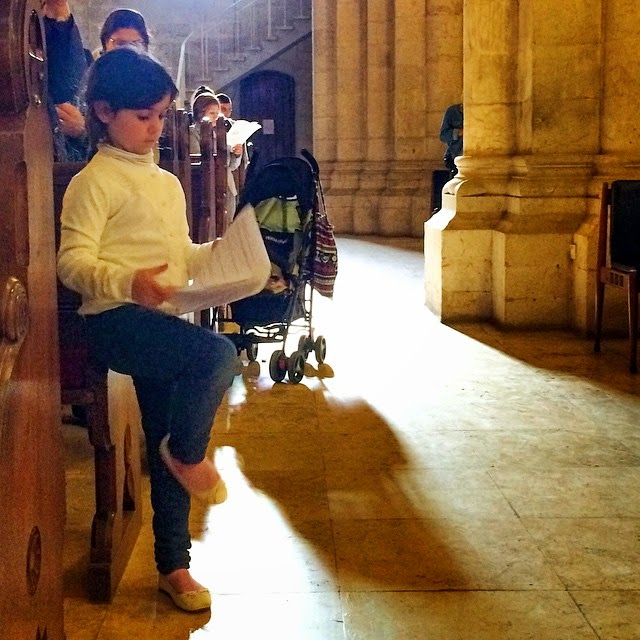Maundy Thursday Reflection: 2 April 2015, Jerusalem
This reflection was preached for the joint Arabic/English/German Maundy Thursday Service at
Lutheran Church of the Redeemer, Jerusalem.
Lutheran Church of the Redeemer, Jerusalem.
 |
| Children attend the Maundy Thursday service at Lutheran Church of the Redeemer, Jerusalem. Photo by Danae Hudson, ELCJHL |
Maundy Thursday Reflection
2 April 2015
Lutheran Church of the Redeemer,
Jerusalem
Grace and peace to you from God our
Father and the Lord Jesus Christ.
Early
tomorrow morning, Redeemer Church members will join their sisters and brothers
in Christ to walk the Via Dolorosa. Slowly, deliberately, and prayerfully, we will
retrace the movements Our Lord Jesus made on his way to the cross, where,
having loved his own who were in the world, he loved us to the end.
But tonight,
we hear the story of the Last Supper, in which Jesus makes his way not to the
cross, but to the washbasin. This short journey is a foreshadowing of the longer,
sorrowful walk to Golgotha. If we were to mark the journey by stations, as we
do the Way of the Cross, it might look something like this:
Station 1:
Jesus gets up from the table.
Station 2:
Jesus takes off his outer robe.
Station 3:
Jesus ties a towel around himself and pours water into the basin.
Station 4:
Jesus washes the feet of his disciples.
By this walk
from the table to the washbasin, Jesus demonstrated for his disciples what was
to come next. He gave them (and us) a sneak preview of the events of Good
Friday, when again he would humble himself, taking on the role of a servant, and
love us to the end.
“You do not know
what I am doing, but later you will understand,” Jesus said. To be fair, we’re
still trying to understand, so many years, so many Good Fridays, so many
Easters later. We still struggle to comprehend the significance of the radical,
subversive, self-emptying love Jesus showed for us. And…we’re still working on
living the command he gave us on the night in which he was betrayed.
“I give you
a new commandment, that you love one another. Just as I have loved you, you
also should love one another.”
Just as
Jesus loved us, so are we to love one another. It seems a simple request,
really, and fairly easy to interpret, especially since we’re given this helpful
object lesson: Love = feet, water, and towels.
But living
this command is harder than it sounds, and the difficulty has nothing to do
with our dislike of feet.
 |
| The author's feet in the Sea of Galilee Photo by Carrie Smith |
If you’ve
ever participated in a foot-washing liturgy, you know the anxiety produced by
the mere mention of taking off shoes in church. In anticipation of Holy
Thursday, church members will head to the nail salon for a pedicure, or they
will buy new socks…or they will skip the service entirely. Most people will
point to their dislike of feet –theirs and their neighbors’—as the reason this
Maundy Thursday foot-washing spectacle just goes too far. “I can love my
neighbor with my shoes on, Pastor,” someone once said to me.
But our real
trouble with the mandatum of Maundy
Thursday has nothing to do with feet at all. In fact, our struggle to love as
Jesus loved us begins before we take off our shoes or kneel at the feet of our
friends, before we ever pour the water, before we even pick up the towel.
Jesus said,
“So if I, your Lord and Teacher, have washed your feet, you also ought to wash
one another's feet.” But when we, like Peter, focus only on feet and water and
service, we miss the scandalous reversal of roles and renunciation of power
Jesus demonstrated at the washbasin—and on the cross.
For Christ
Jesus, “though he was in the form of God, did not regard equality with God as
something to be exploited, but emptied himself, taking the form of a slave,
being born in human likeness. And being found in human form, he humbled himself
and became obedient to the point of death—even death on a cross.” (Philippians 2:6-8)
This is why
the new commandment to love is so difficult—because the first step of the
journey from the table to the washbasin is this: Jesus got up from the table.
In other
words, if we are to love as Jesus loved us, we must begin as he did, by relinquishing
our positions of power and privilege at the head of the table.
If we are to
love as Jesus loved us, we must shed our outer garments—the robes of class, or
education, or patriarchy, or institutional power which set us above and apart
from others.
If we are to
love as Jesus loved us, we must tie a towel around our waists in solidarity
with workers, with the poor, with the oppressed, with the foot-washers of the
world.
Then, and
only then, can the water be poured. Only then are we ready to serve. Only then
are we prepared to love as we have been loved.
The truth
is, we cannot do this of our own power. We can only do this through our Lord
Jesus Christ, who in laying down his life and picking it up again has empowered
us to follow in his steps, to the washbasin and to the cross.
And, so, beloved,
let us love one another. By this will everyone know we are his disciples, if we
have love for one another. Amen.
Comments
Post a Comment